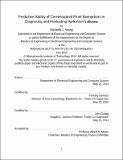Predictive ability of cerebrospinal fluid biomarkers in diagnosing and evaluating Parkinson's disease
Author(s)
Wang, Michelle J
DownloadFull printable version (667.1Kb)
Other Contributors
Massachusetts Institute of Technology. Department of Electrical Engineering and Computer Science.
Advisor
Timothy Denison and Timothy Denison.
Terms of use
Metadata
Show full item recordAbstract
Currently, there are a variety of clinical assessments and rating scales used in the research and treatment of Parkinson's disease (PD). Despite the widespread use and reliance on these scales, they do not offer a uniform, objective measure. Many previous studies have indicated promising relationships between various biomarkers and Parkinsonian symptoms that could lead to objective measures by using statistical methods and providing p-values. However, we could not find any literature that uses machine learning or directly tests predictive value. The goal of this thesis was to determine whether or not cerebrospinal fluid (CSF) biomarker data could predict incidence of Parkinson's with a high degree of accuracy and differentiate between patients with varying levels of severity. We used various supervised machine learning algorithms on the Parkinson's Progression Markers Initiative (PPMI) baseline data set provided by the Michael J. Fox Foundation, and reported the percentage of patients correctly diagnosed by each algorithm on an isolated test data set. The best classifier averaged 69% accuracy in distinguishing human controls from PD patients. While this does indicate the presence of some predictive power, it is not clinically useful and we tentatively conclude a negative result. The data pertain to the CSF biomarkers available from PPMI at the end of October 2013.
Description
Thesis: M. Eng., Massachusetts Institute of Technology, Department of Electrical Engineering and Computer Science, 2014. This electronic version was submitted by the student author. The certified thesis is available in the Institute Archives and Special Collections. Cataloged from student-submitted PDF version of thesis. Includes bibliographical references (page 31).
Date issued
2014Department
Massachusetts Institute of Technology. Department of Electrical Engineering and Computer SciencePublisher
Massachusetts Institute of Technology
Keywords
Electrical Engineering and Computer Science.